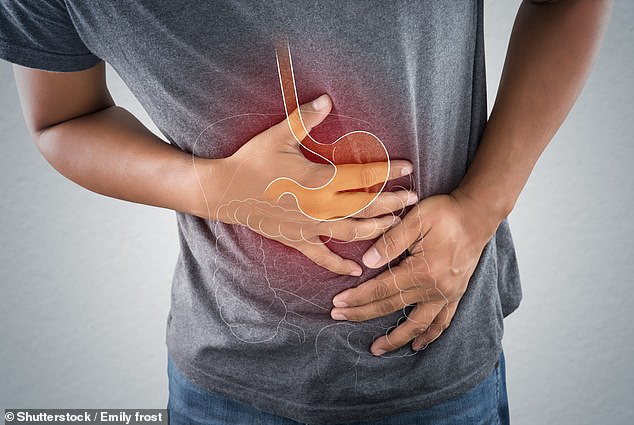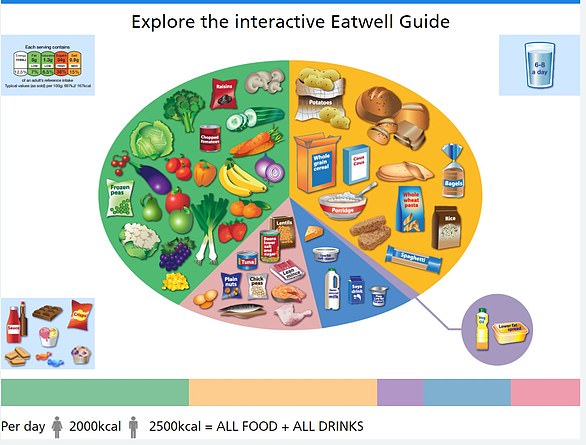Five Ways to Improve Your Gut Health, According to a Doctor
Gut health is one of the hottest health topics, with thousands of us looking for ways to beat bloating without radically changing our lives.
But despite #gutmicrobiome generating more than 730,000 views on TikTok every week, 58 percent of people surveyed by Holland & Barrett don't know that gut health can also impact their mental health.
Another 60 percent don't know that taking care of their gut health can also impact their immunity.
Doctors say eating plenty of fiber, plant foods, and fermented foods are simple ways to keep your gut in check.
Here, London-based Dr. Megan Rossi, nicknamed The Gut Health Doctor, shares her tips on how to proactively care for your gut health.

London-based gut health expert Dr. Megan Rossi shares her tips for a healthy gut, including eating more fiber and incorporating as many fruits and vegetables into your diet as possible
Enjoy fiber
It's perhaps not surprising that fiber is a crucial ingredient for a healthy gut microbiome – the name for the trillions of microorganisms that live in our bodies.
It is essential for helping our digestion and preventing constipation.
And studies have also been linked to lowering the risk of conditions such as heart disease, type 2 diabetes and colon cancer.
But in Britain, many of us don't eat enough fibre.
The British Nutrition Foundation highlights that the recommended daily amount of fiber for British adults is 30 grams, but on average Britons only consume around 20 grams.
'You can increase your intake by eating foods rich in fiber and it's not just your vegetables, but berries, oats, chia seeds, lentils and even dark chocolate are good sources,' says Dr Rossi.
Plants, plants and more plants!
However, it's not just fiber that we need to eat more of. Plants in general are essential, says Dr. Rossi, who recommends buying a wide variety of them.
“To achieve optimal health, my recommendation is to eat all plant groups: vegetables, fruits, whole grains, legumes, nuts and seeds, and don't forget those herbs and spices,” says Dr. Rossi.
That's because plants contain thousands of phytonutrients, bioactive compounds that our gut microbes thrive on.
“This explains why one of the simplest ways to improve gut health and resilience is to eat a more varied, plant-based diet that supports a more diverse microbiota in the gut,” she said.
However, according to a recent study by Holland & Barrett, people only eat less than three servings of fruits and vegetables per day on average.
The research also found that almost three-quarters of people eat fewer than ten different types of plants per week. Many experts recommend getting 30 per week.
Fermented foods


According to doctors, eating plenty of fiber, plant foods and fermented foods are simple ways to keep your gut in check
Fermented foods have exploded in popularity, and for good reason.
Adding kimchi or kombucha to your diet can give your gut health the boost it needs, says Dr. Rossi.
That's because fermented foods, which are made by adding microorganisms like bacteria or yeast to products like vegetables, tea or milk, work wonders for the gut.
They contain probiotics: live microbes marketed as providing health benefits.
'Britain has tapped into its potential benefits, with research showing that a diet high in fermented foods was linked to lower markers of inflammation and greater microbe diversity,' Dr Rossi said.
But you don't have to munch on sauerkraut to incorporate fermented foods into your diet, because there are simple swaps.
'You can easily switch to or add fermented foods, for example by switching to kefir or plain yoghurt, adding cottage cheese, miso or trying a delicious kombucha drink,' says Dr Rossi.
The gut:brain connection


It's not just fiber, but plant foods in general. Plants contain thousands of bioactive compounds known as phytonutrients, many of which our gut microbes thrive on
Eating a healthy and balanced diet can also affect your mental health. The two are connected via the vagus nerve, which runs from the brain through the face to the abdomen.
“This often means that what happens in your brain can influence what happens in your gut, and vice versa,” says Dr. Rossi.
But it's not just about what you eat affecting your brain; Breathing exercises that can help our brain also seem to benefit our gut.
'Several studies show that non-diet approaches designed to target the gut-brain connection, including breathing exercises, gut-focused hypnotherapy and cognitive behavioral therapy (CBT) can improve digestive symptoms such as abdominal pain and bloating to the same extent as following a diet plan. specialist. diet,” said Dr. Rossi.
'This is a rapidly growing field, with more and more studies emerging to help us understand how nutrients and components of diet can influence the gut-brain axis.'
Mindful eating
It may sound strange, but a healthy gut is not just about what you eat.
By paying close attention to how you eat and what you experience, you can also contribute to maintaining a healthy intestine. This is known as mindful eating.
“It's when we deal with all the sensations we experience when eating and drinking, including sight, sound, touch, smell and taste,” said Dr. Rossi.
Research also shows that good intestinal health is not just about what we eat, but also about how we eat it.
For example, according to a 2019 study, focusing on chewing helps with digestive complaints such as bloating. study.
“To eat more mindfully, it helps to sit at the table and minimize distractions, in addition to enjoying all five senses mentioned above,” says Dr. Rossi.

